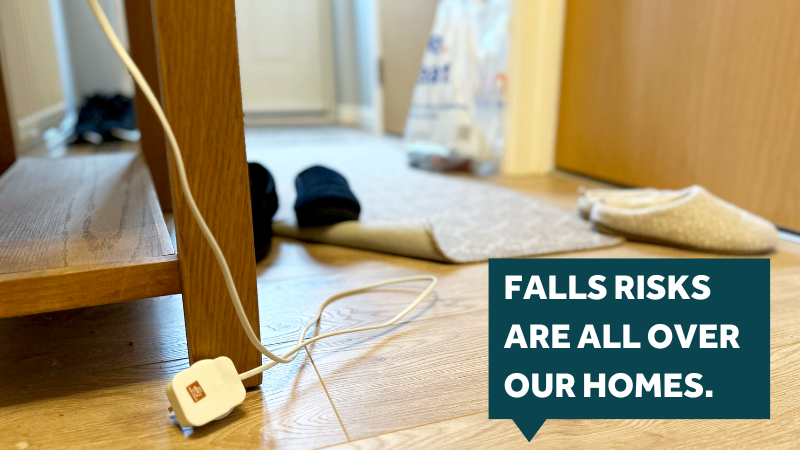
Each year we respond to thousands of calls related to falls. While many of these are simply one off accidents, there are lots of people out there who are more vulnerable and susceptible to falling. This could result in life changing consequences which is why it’s really important that we do all we can to help reduce the risk of further falls.
Across the region there is a considerable number of schemes that our clinicians can refer patients to who have fallen, providing they have given consent, that aim to help patients who are at risk of falls. All of our frontline staff are educated in the importance of this long term to maintain their patients’ health and wellbeing.
Prevention advice
There are several reasons why people fall, this can be down to personal risk factors such as weak muscles, poor balance and walking difficulties. If you are vulnerable to falling or you care for somebody who is vulnerable, there are actions you can take to minimise falls around the home.
At home, we tend to move around without thinking about our safety as it is where we are comfortable and where we spend much of our time. Falls prevention in and around the home may seem like common sense, however, it isn’t always easy to recognise the things that can cause trips, slips and falls.
Many falls could be prevented by making a few small changes in your home. An important first step toward preventing falls at home is to remove anything that could cause you to trip or slip while walking around.
To do this:
- clear clutter from floors or stairs – including small furniture, pet bowls, trailing cables, or other things that can cause you to trip
- avoid leaving or storing items on stairs and hallways
- arrange furniture to give plenty of room to walk freely
- remove loose mats and rugs to reduce the risk of tripping accidentally
- improve lighting
- store frequently used items within easier reach
- change or adapt furniture and furnishings to give more support. These changes may also make it easier to get around your home and carry out daily activities.
It can be helpful to have someone else, such as a friend, relative or neighbour you trust to have a look with you to see if there is anything that could be made safer.
How medicines management can help you stay safe as you age
Falls are not an inevitable part of getting older. In fact, many falls can be prevented as they often result from a combination of factors.
Medicines can contribute to falls by causing side effects such as drowsiness, dizziness, confusion, dehydration, and vision problems.
Top medicines tips to prevent falls:
- Learn about your medicines,the side effects and what you should and shouldn’t take them with.
- Do not change or stop any medicines without talking to your GP or local pharmacist first.
- Organise and plan your medicines to ensure you are taking them as prescribed.
- Ask your GP or local pharmacist for a medicines review, especially if it’s been longer than 12 months since your last one.
- If you have a fall, do not ignore it – let your GP or local pharmacist know. They can provide falls prevention advice.
Download the medicines management postcard.
Support
Healthcare professionals take falls in older people very seriously because of the huge consequences they can have for the health and wellbeing of this group.
As a result, there’s a great deal of help and support available for older people, and it’s worth asking your GP or healthcare professional about the various options.
Your GP or healthcare professional may refer you to a specialist falls prevention service to carry out some simple tests to check your balance.
Your GP or healthcare professional can also review any medicines you’re taking in case their side effects may increase your risk of falling.
Your GP or healthcare professional may also recommend:
- looking after your eyes with a sight test if you’re having problems with your vision, even if you already wear glasses
- having an electrocardiogram (ECG) and checking your blood pressure while lying and standing
- requesting a home hazard assessment, where a healthcare professional visits your home to identify potential hazards and give advice
- doing exercises to improve your strength and balance.
What should I do if I fall?
If you have a fall, it’s important to keep calm. If you’re not hurt and you feel strong enough to get up, do not get up quickly.
Roll onto your hands and knees and look for a stable piece of furniture, such as a chair or bed.
Hold on to the furniture with both hands to support yourself and, when you feel ready, slowly get up. Sit down and rest for a while before carrying on with your daily activities.
If you’re hurt or unable to get up, try to get someone’s attention by calling out for help, banging on the wall or floor, or using your personal alarm or security system (if you have one). If possible, crawl to a telephone and dial 999 to ask for an ambulance.
Try to reach something warm, such as a blanket or dressing gown, to put over you, particularly your legs and feet.
Stay as comfortable as possible and try to change your position at least once every half an hour or so.
You may want to get a personal alarm system so that you can signal for help in the event of a fall.
An alternative would be to always keep a mobile phone in your pocket so you can phone for help after having a fall.